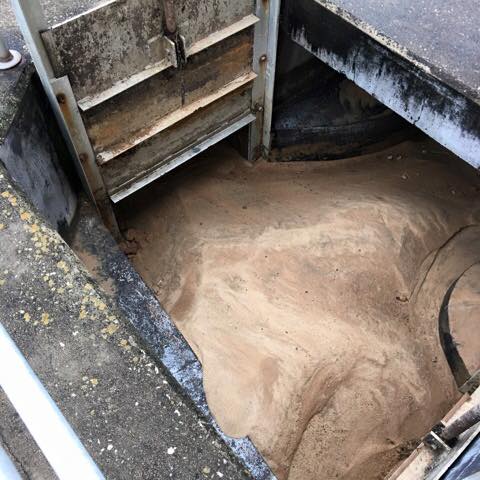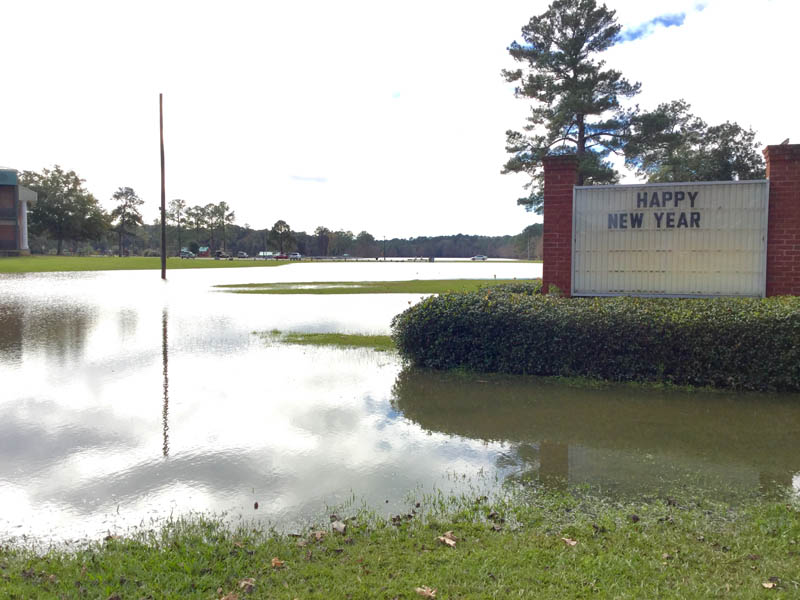
Monday afternoon update
We emailed Julie Harris at the City of Bainbridge with some additional questions about the issues at the Wastewater Treatment Plant and here was her response:
Sowegalive: In the pictures you posted on Facebook, when it shows the Decatur County Fire and Rescue pumper truck, what exactly was happening there?
Harris: In one of the photos I previously shared, you will see the Decatur County Pumper Truck. It was used to pump water into the “Grit Chamber” which was completely filled with sand in an effort to dilute the sand so it could be pumped out of the chamber by the vacuum truck.
Sowegalive: Even though the City of Bainbridge couldn’t predict the pipe failing and the grit coming in, are there any indications the Georgia EPD will penalize the City of Bainbridge for allowing raw sewage into the river? Will the City of Bainbridge be responsible for any cleanup, if possible?
Harris: The City of Bainbridge is not expecting to be penalized by the EPD in any way. The sewage that is entering the water is being diluted by the river water so no “clean-up” will be possible and is actually aided by the unusually high volume of river water due to recent flooding.
Sowegalive: Are there any updates on the process of cleaning out the treatment plant and getting it operating normally again?
Harris: The WWPCP is expected to be operational this afternoon (Monday). The part that was delayed has arrived and is being repaired at this time.

A pipe at the Bainbridge Wastewater Treatment Plant broke during last week’s flooding, halting normal operations at the plant and sending raw sewage into the Flint River and Earle May Boat Basin, according to city officials.
The entrance to the Earle May Boat Basin was completely blocked off over the weekend, to prevent anyone from being exposed to the dirty water overflowing into the Boat Basin, according to Julie Harris, public relations director with the City of Bainbridge. She noted that last week, when the water had been high, more people than usual had been fishing than usual, before the hazardous water flowed in.
Clean-up is taking place today at the Earle May Boat Basin in the aftermath of recent flooding. Crews have blocked off…
Posted by Historic Bainbridge Georgia on Monday, January 11, 2016
Waste Water Pollution Control Plant Update: Due to circumstances beyond control, sewage is backed up and is currently…
Posted by Historic Bainbridge Georgia on Monday, January 11, 2016
News Release
Last week, it was discovered that a light pole located at Bill Reynolds 1 Ballfields had, for some reason, fallen into the woods behind the complex. Upon investigation it was determined that the ground under the light pole had been undermined as a result of a collapse of a sewer line that runs in that immediate area. Over the previous weekend, there had been a significant spike in the volume of water entering the Waste Water Pollution Control Plant (WWPCP) and in the amount of sand and grit that was entering the plant.
On Monday, January 4, volumes in excess of 7.5 million gallons of influent were entering the plant as compared to a normal volume of 1.5 million gallons. In essence, the collapsed pipe was sucking river water, sand and sediment into the treatment plant.
On Tuesday, Blankenship Construction was contacted to begin preparations for making emergency repairs to this line. This process was complicated by the flood which had the area under about 4 feet of water. In order to gain access to the line, the affected area will be dammed off and the flood water will be pumped away from the site. In addition to the flood waters, the groundwater level is at 18 inches below surface. The ground water will have to be pumped off to gain access to the pipe which is 20 feet below the surface.
Late Friday afternoon, the WWPCP was overwhelmed by the amount of sand that had entered the plant and the plant was shut-down so that sand could be removed. The plant will remain shut-down until a bypass pump is in place that will stop the flow of river water into the plant. The plant is not operational. The Georgia Environmental Protection Division has been notified of the situation and they are monitoring activities.
The City of Bainbridge and Blankenship both have crews working over the weekend to fix this problem. There should a by-pass in place by Monday and be back to normal operation at the Treatment Plant.
The cities of Thomasville, Moultrie, and Blakely as well as Decatur County are providing assistance. The Georgia EPD as well as US EPA have been notified and are providing technical assistance. City of Bainbridge crews worked until midnight Friday night.
[Best_Wordpress_Gallery id=”66″ gal_title=”Bainbridge Wastewater Treatment Center Flooding”]






Be the first to comment